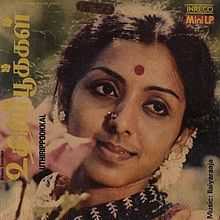Uthiripookkal
| Uthiripookkal | |
|---|---|
 LP Records Cover | |
| Directed by | J. Mahendran |
| Produced by | Radha Balakrishnan |
| Screenplay by | J. Mahendran |
| Story by | Pudhumaipithan |
| Based on |
Chitrannai by Pudhumaipithan |
| Starring |
Vijayan Ashwini Mathumalini Sarath Babu Charuhasan |
| Music by | Ilaiyaraaja |
| Cinematography | Ashok Kumar |
| Editing by | B. Lenin |
| Studio | Dimple Creations |
| Release dates | October 19, 1979 |
| Running time | 129 min. |
| Country | India |
| Language | Tamil |
Uthiripookkal is a 1979 Tamil drama film directed by J. Mahendran based on Pudhumaipithan's short story Chitrannai.[1] It stars Vijayan, Ashwini, Mathumalini and Sarath Babu. The film featured music by Ilaiyaraaja, cinematograohy by Ashok Kumar and editing by B. Lenin who made his debut in this film.[2] The film has been critically acclaimed and considered a landmark film in Tamil cinema.[1][3][4][5]
Plot
Sundaravadivelu (Vijayan) is a wealthy school manager and a landlord who is a hedonist and a sadist. He finds pleasure in torturing people emotionally including his own family members. His wife Lakshmi (Ashwini) is a goodhearted homely wife, and he has two children. Sundaravadivelu never respects his wife's feelings. He is an irresponsible husband and a father. Lakshmi's father is indebted to Sundaravadivelu as he had borrowed money from him. Using this as a trump card, Sundaravadivelu proposes Lakshmi's sister. But Lakshmi's sister and father do not approve this. Sundaravadivelu is infuriated and forces out his wife from his house falsely accusing her of having an affair with the health inspector of the village. Lakshmi, who is seriously ill, passes away soon. Sundaravadivelu marries again, and his second wife shows no love or care for his kids. Meanwhile, Lakshmi's sister develops a liking towards an school teacher working at Sundaravadivelu's school. The teacher, knowing Sundaravadivelu's sadism and ill mindset, resigns from school and then proposes Lakshmi's sister. The marriage is set, and on the previous day, Lakshmi's sister goes to Sundaravadivelu's house, requesting him to send his kids with her, so that she can take care of her. Sundaravadivelu molests her which is seen by his second wife. His wife ditches him and go her way. The villagers are provoked and maddened now. They corner Sundaravadivelu and ask him to choose his way of death, and finish his life. Sundaravadivelu commits suicide, and in his last moments, he realises that he was always a sadist. Moments before his death he shares a tender moment with his kids.
Cast
- Vijayan as Sundaravadivelu
- Ashwini as Lakshmi
- Mathumalini as Shenbagam
- Sarath Babu
- Charuhasan
- Sundar as Prakash
- Premi as Premi
- Master Haja Sheriff
- Baby Anju as Bhavani
Soundtrack
This movie features 5 songs composed by Ilaiyaraaja and lyrics written by Kannadasan, Ilaiyaraaja, Gangai Amaran, M. G. Vallaban and Muthulingam.
- Antha Poongathu - Ilaiyaraaja
- Naan Paada - S. Janaki
- Azhagiya Kanne - S. Janaki
- Kalyaanam Paaru - S. P. Sailaja
- Poodaa Poodaa Pokkai - S. Janaki
Legacy
The film is considered as a break through in commercial Tamil cinema and has been lauded by other acclaimed filmmakers.[3] Director Mani Ratnam once famously remarked: "If I get anywhere near what Mahendran did in Udhiri Pookkal, I’ll be a happy man."[4][6] The Times of India wrote that "1979 was the year of Uthiripookkal".[7] IBN Live included the film in its list of 100 greatest Indian films of all time.[8]
Awards
- Filmfare Award for Best Director – Tamil - J. Mahendran
- Tamil Nadu State Film Award for Best Female Playback - S. Janaki[9]
External links
References
- ↑ 1.0 1.1 kavitha muralidharan (2013-08-11). "Second coming?". The Hindu. Retrieved 2013-12-30.
- ↑ "Master of creative final touches". Retrieved 27 November 2012.
- ↑ 3.0 3.1 "Filmmakers’ favourites". The Hindu. 2007-07-13. Retrieved 2007-10-06.
- ↑ 4.0 4.1 "The magic of Mahendran". The Hindu. 2007-09-06. Retrieved 2007-10-06.
- ↑ "A tale rooted in the soil". The Hindu. 2003-11-28. Retrieved 2013-12-30.
- ↑ "Cannes is not my goal". The Hindu. Retrieved 27 November 2012.
- ↑ http://timesofindia.indiatimes.com/entertainment/movie-reviews/ninaithale-inikkum/movie-review/23629252.cms
- ↑ "100 Years of Indian Cinema: The 100 greatest Indian films of all time". IBN Live. Retrieved 6 May 2013.
- ↑ "Awards and Achievements". Retrieved 27 November 2012.
| ||||||||||||||